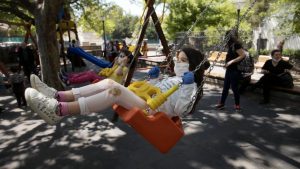By now, all these months into the new COVID-19 normal, there isn’t much new for families to do. The Monopoly figures have lost their shine, you’ve discovered every good spot for hide and seek, and the words ‘I’m bored’ have lost all meaning.
As a busy physician or healthcare professional, you’re seeing more of your immediate family members than you can remember. And that’s a silver lining. However, even if kids are back in school for the moment, things are far from how they used to be. Aside from siblings or possible cohorts, there is still an element of separation from their friends and the environment that they are used to.
Now, while you’re responsible for the physical and mental health of your patients, you’re also feeling more of the burden of the impact of the pandemic on those closest to you. Again, to ensure your time is spent focusing on what’s most important, consider some of your necessary work duties to be outsourced, such as your patient documentation. Consider having it done by medical transcription experts. Take your doctor dictation online with trusted medical transcriptionists.
For every age in your household, there are ways to encourage growth in mind and body. This includes a certain amount of play per day. Children and adolescents ages six through 17 should do 60 minutes or more of moderate-to-vigorous intensity physical activity each day, as well as activities that strengthen bones (like running or jumping) and build muscles (like climbing or doing push-ups) three days each week.
On top of physical activity, also known as active play, kids should enjoy creative play such as arts, crafts, and puzzles. Pretend play uses language and thinking skills to learn about the world, develop imagination and solve problems. This includes acting out real-life and imaginary situations. You can weave all three types of play into everyday activities with your child.
 Each age group will need a different focus to keep brains and bodies busy during the pandemic down-time. For outdoor play ideas for all ages, check out Outdoor Play.
Each age group will need a different focus to keep brains and bodies busy during the pandemic down-time. For outdoor play ideas for all ages, check out Outdoor Play.
Babies
Exploring movement by reaching for and holding things, toys for babies don’t need to be expensive. Empty containers and household cooking utensils are great early toys. Caring For Kids recommends unbreakable toys with no loose parts or sharp edges. Stacking toys and objects that make sounds or use soft fabrics are good ways to help baby explore.
Engaging based on your baby’s cues is a key building block for brain development. Talk, sing, smile and make faces together. Play with language using nursery rhymes and songs with actions to help babies understand words. Reading with them every day and allowing them to touch and play with books will get them interested in words.
Toddlers
Playtime for toddlers becomes more active as they begin to walk, run and explore their environment.
Together, you can pretend to be different animals you might see in the neighbourhood or you kick, roll and catch a ball. Games like “I Spy”, active games like “Red Light/Green Light” and “What time is it, Mr. Wolf?” are good for interaction and development.
School-age
Your child’s world begins to expand as they learn and explore more outside the home. While museums, libraries and galleries may not be open depending on your city’s level of lockdown, you safely visit many of these places online. You can take virtual field trips to many places, like Alberta’s Royal Tyrrell Museum or the world-famous San Diego Zoo. Writing or giving oral reports on what they learned, drawing their favourite animals or building something they saw can trigger the brain and turn play into learning. Gardening is also a great family activity. Check out more at Today’s Homeowners.
Teens
It might be tough for teens to adjust to staying home so much during this pandemic. They may be missing friends outside of school, and some of their sporting events. Your teens can explore more than 2,000 museums in 80-plus countries through Google Arts and Culture. To get them moving, YMCA provides virtual fitness classes. YThrive GROW workouts help kids of all ages build balance, strength and endurance.
Adults
Adults need playtime, too. Set aside a few minutes of your own every day to have fun, melt stress, battle boredom and be happy.
It can be overwhelming for health care practitioner parents to balance playtime and everyday work. When you take care of your own needs, you are more able to create a healthy family space. So read a book, watch a movie, or go for a walk. And always make time for your significant other.
Up next: A list of essential resources for the family
2Ascribe Inc. is a medical and dental transcription services agency located in Toronto, Ontario Canada, providing medical transcription services to physicians, specialists (including psychiatry, pain and IMEs), dentists, dental specialties, clinics and other healthcare providers across Canada. Our medical and dental transcriptionists take pride in the quality of your transcribed documents. WEBshuttle is our client interface portal for document management. 2Ascribe continues to implement and develop technology to assist and improve the transcription process for physicians, dentists and other healthcare providers, including AUTOfax. AUTOfax works within WEBshuttle to automatically send faxes to referring physicians and dentists when a document is e-signed by the healthcare professional. As a service to our clients and the healthcare industry, 2Ascribe offers articles of interest to physicians, dentists and other healthcare professionals, medical transcriptionists, dental transcriptionists and office staff, as well as of general interest. Additional articles may be found at http://www.2ascribe.com. For more information on Canadian transcription services, dental transcription, medical transcription work or dictation options, please contact us at info@2ascribe.com.

